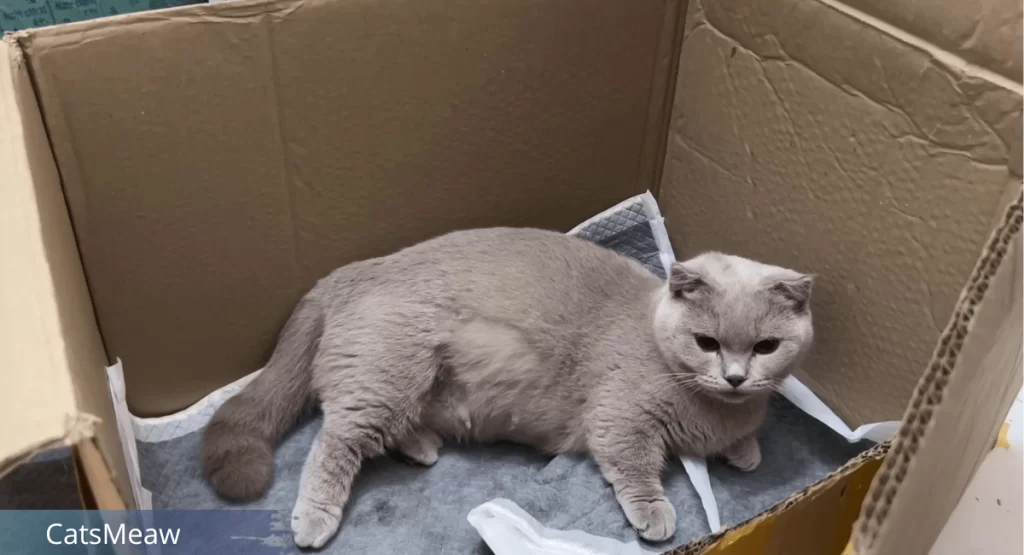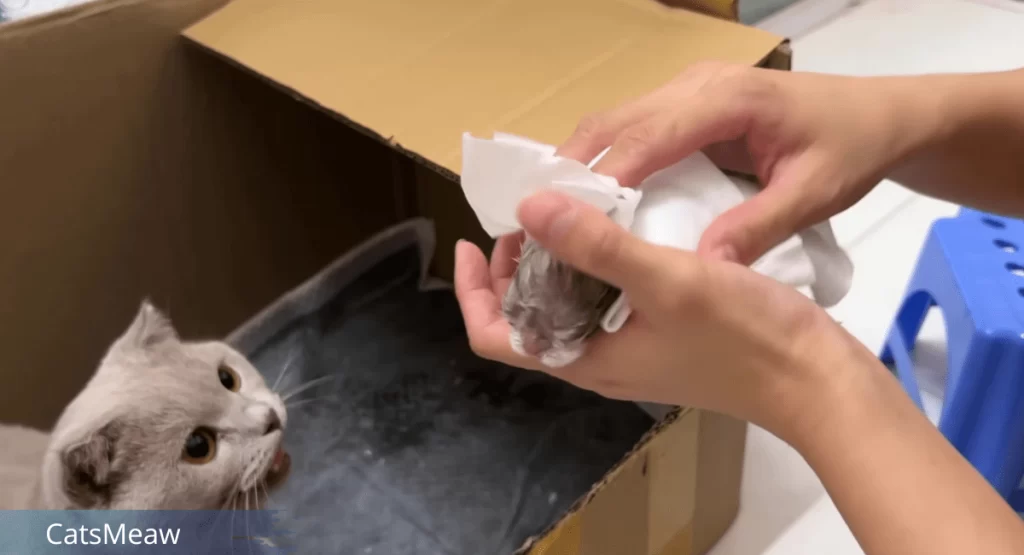The pregnancy period of a cat is a little over 2 months. It takes between 60 and 66 days. If your cat is pregnant, you are probably asking yourself several questions: how to see the end of the cat pregnancy to act accordingly? Or how do you know if the kittens are okay?
Don’t worry, we will inform you about the different symptoms to observe in your cat to monitor the stage of pregnancy, but also advise you on the procedure to follow to properly prepare for this wonderful moment that is the birth of kittens.

Table of Contents
How long does a cat pregnancy last?
A cat pregnancy generally lasts between 63 and 65 days on average, or a little over nine weeks. However, the exact duration may vary slightly from cat to cat.
The cat pregnancy period can be affected by various factors such as the breed of the cat, the number of kittens expected and the general health of the cat. If you suspect that your cat is pregnant, it is advisable to consult a veterinarian for personalized advice and appropriate monitoring throughout the pregnancy.
Symptoms: how do I know if my cat is pregnant?
A cat goes into heat several times a year and is very fertile. If you let it out during this period, there is a good chance that it will be pregnant. But in the first few weeks, there are very few changes or signs that will make you think your cat is expecting babies. In cats, there are no characteristic symptoms at the start of pregnancy such as morning sickness or extreme fatigue, which can, however, be observed in dogs and humans.
You will have to wait 3 or 4 weeks of pregnancy to observe changes in its behavior. Thus, you will be able to notice that its character is different: it can be calmer or more fearful and be cuddly. It will look for cozy places to take refuge.
Your cat will also gain weight and you will see its belly a little more swollen around 30 days of pregnancy . Its pelvis will gradually widen. Its appetite will increase and it will drink more than usual. From the fourth week onwards, the udders are swollen due to the increase in milk.
Related: Best Practices to Get Rid of Cat Fleas
If you suspect that your cat is pregnant, it is imperative to have it closely monitored by a veterinarian to avoid complications during its pregnancy. An ultrasound can be performed after 3 weeks of pregnancy to observe the fetuses to confirm that it is indeed pregnant. To find out how many kittens it is expecting, an abdominal x-ray can be taken a few days before the term.
How do I know how long my cat has been pregnant?
To determine how long your cat has been pregnant, you can follow a few steps:
Observing Physical Signs: As pregnancy progresses, your cat will begin to show physical signs of pregnancy. These signs include an expanding abdomen, enlarging and darkening udders, and sometimes behavioral changes such as finding a quiet place to rest.
Heat history: If you noticed that your cat was in heat and observed mating during this time, you can estimate the start of pregnancy from that time. Cat pregnancy generally lasts between 63 and 65 days from the date of mating.
Veterinary Consultation: If you are unsure about the length of pregnancy or want professional confirmation, you can take your cat to the veterinarian. The veterinarian can perform a physical examination and, if necessary, an ultrasound to estimate the duration of cat pregnancy and check the health of the cat and kittens.
By combining these methods, you can get a pretty good idea of how long your cat has been pregnant. It is always recommended to consult a veterinarian for advice and proper monitoring during your cat pregnancy.
How does a pregnant cat act?
Pregnant cats do not show any distinctive signs and it is not easy to know if your cat is expecting babies. However, you can observe certain signals that will help you know if your female cat is pregnant:
- Her character changes: it is more cuddly or fearful, it purrs a lot and seeks calm and cozy places in preparation for the birth
- His appetite will increase
- It is gaining weight, its stomach is rounding and its pelvis is widening
- Around 4 weeks of pregnancy , its udders are swollen and begin to harden
At the end of the pregnancy, your cat will be more agitated and will meow more. You will be able to observe the milk flowing from its udders. It looks around the house for a quiet place. This is a sign that birth is near.

What is the course of cat pregnancy?
If your cat is pregnant, at the very beginning, the changes are not significant. In the first weeks you may be able to observe an evolution in its character and behavior: your cat is more cuddly, seeks your company or, conversely, isolates itself.
Then, quite quickly afterwards, you will see that it gains weight. It will also eat and drink more. The volume of its abdomen increases and its pelvis widens. In the fourth week of pregnancy, its udders swell and harden due to the flow of milk.
This is the time to give it a suitable diet, by providing it with kitten food that will cover the nutritional needs. You can also continue this diet until the kittens are weaned.
In the middle of the cat pregnancy and/or in case of doubt, it is best to consult your veterinarian who can reassure you that the pregnancy is going well. He will also be able to tell you the number of kittens to be born by doing an ultrasound.
Related: Most Dangerous foods for cats
Finally, around the ninth week of the cat pregnancy, certain signs indicate an imminent birth: your cat is very agitated, it meows a lot, it is losing milk and is looking for a place to give birth. You can prepare a box for it with fabric and cushions, but it may choose another place itself.
What should you do when your cat is pregnant?
What care should I provide?
A pregnant cat needs a suitable diet: it must be given good quality kitten food which will provide it with the nutrients it needs. You should not limit your food intake during pregnancy: make sure that your cat always has plenty to eat and drink.
It is important to continue to deworm and treat a pregnant cat for fleas and ticks. Your veterinarian will tell you which ones are safe to use during pregnancy.
For the rest you won’t have much to do. Keep an eye on it and if you have the slightest doubt (bleeding, seems depressed, etc.), consult your veterinarian.
How do I prepare my cat for giving birth?
Some domestic cats do not want to be alone to give birth. If this is the case, your pet will purr loudly and beg for affection. Help it by speaking soothingly and petting it.
You can set up a cat nest for it in a cardboard box where you will put towels or fabric. But it can choose another place that suits it better. In this case, leave it alone and watch it discreetly.
Your cat is fully capable of giving birth on its own. Please note that approximately 2 hours pass between the first contractions and the birth of the kittens. If the kitten leaves its mother’s womb in a few minutes, it can be an hour before the next one arrives. The mother usually cuts the umbilical cords and ingests the placenta.
How to recognize the behavior of a cat who is about to give birth?
There are several signs that can indicate that a female cat is about to give birth. Here are some of the most common signs:
Physical Changes: The cat may begin to show obvious signs of pregnancy, such as a very large abdomen and udders that swell and become firmer. Its udders may also start producing milk a few days before giving birth.
Unusual behavior: The cat may become more agitated or anxious as the delivery date approaches. It may look for a secluded, comfortable place to rest and give birth to its kittens.
Loss of appetite: Some cats may lose their appetite a few hours before giving birth. However, others may continue to eat normally.
Increased Grooming: The female cat may spend more time grooming itself, especially around its genital area.
Body temperature: The cat’s body temperature may drop slightly (below 38°C) in the 24 hours before giving birth.
Contractions: When giving birth begins, the cat may show signs of uterine contractions, such as tremors or straining to push.
If you notice these signs in your cat and think it is about to give birth, make sure you provide it with a quiet, clean, and safe place to give birth. It is also a good idea to contact your veterinarian for advice on how to care for the cat and kittens during and after giving birth.
